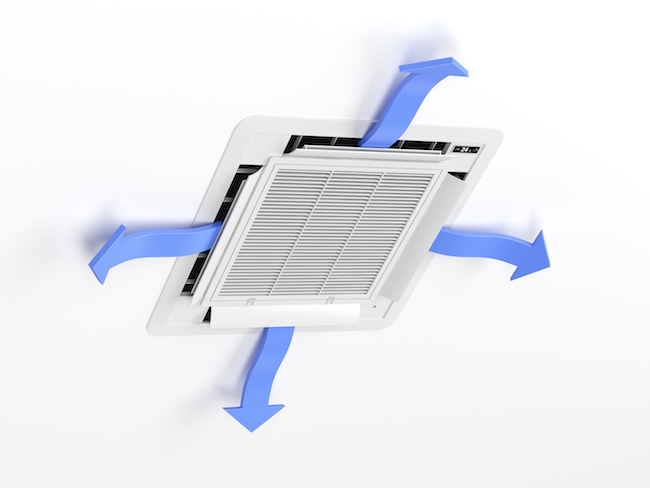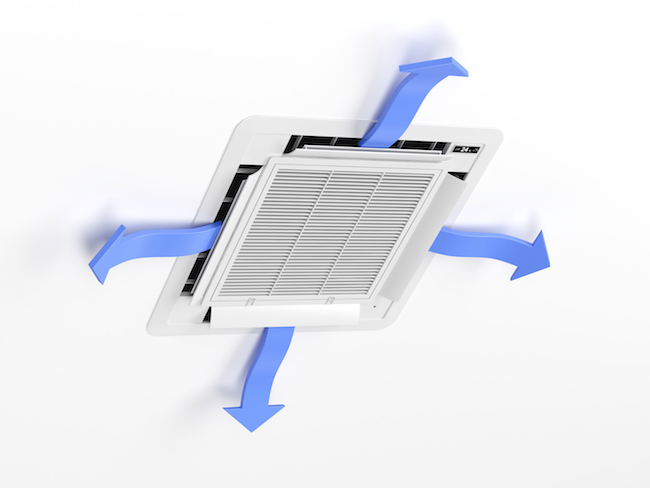Indoor air quality is often overlooked, yet it plays a crucial role in our overall health and well-being. We spend the majority of our time indoors, whether it’s at home, work, or school, and the air we breathe in these spaces can greatly impact our health. Without proper ventilation, the air can become stale and stagnant, leading to a variety of issues such as allergies, headaches, and respiratory problems. This is why it’s essential to have a good air ventilation system in place to circulate fresh air and maintain a healthy and comfortable indoor environment. Let’s explore the importance of air ventilation and how it can benefit you in more detail.
The Hidden Threat of Poor Air Quality
When we think about threats to our health, we often picture external factors such as pollution, viruses, or even accidents. However, there is a hidden threat lurking within our own homes, offices, and schools – poor air quality. It’s easy to overlook, but the air we breathe indoors can have a significant impact on our health and well-being.
Poor air quality occurs when the air in a confined space becomes stagnant, polluted, or lacks proper ventilation. This can happen when there is a lack of fresh air circulation or when harmful pollutants and allergens are not effectively filtered out. The consequences of breathing in poor quality air can be detrimental to our health.
One of the main risks associated with poor air quality is the development or exacerbation of respiratory problems. Breathing in pollutants and allergens can irritate our airways and trigger asthma attacks or allergic reactions. Long-term exposure to poor air quality has also been linked to the development of chronic respiratory conditions such as chronic obstructive pulmonary disease (COPD).
In addition to respiratory issues, poor air quality can also lead to other health problems. Headaches, fatigue, and difficulty concentrating are common symptoms experienced by individuals exposed to stale and polluted air. Furthermore, studies have shown that prolonged exposure to poor air quality can increase the risk of heart disease, stroke, and even certain types of cancer.
 Unveiling the Benefits of Proper Air Ventilation
Unveiling the Benefits of Proper Air Ventilation
Proper air ventilation is not just a luxury – it’s a necessity for maintaining a healthy and comfortable indoor environment. The benefits of having good air ventilation in your home, office, or school are numerous and far-reaching. Let’s unveil the benefits of proper air ventilation and see why it’s a game-changer for your well-being.
First and foremost, proper air ventilation helps to circulate fresh air throughout the space. This means that stale and stagnant air, which can be filled with harmful pollutants and allergens, is replaced with clean and oxygen-rich air. Breathing in fresh air is essential for our respiratory health and can prevent respiratory problems such as asthma and allergies.
Additionally, good air ventilation helps to control humidity levels. High humidity can lead to the growth of mold and mildew, which can cause allergies and respiratory issues. By properly ventilating the space, excess moisture is removed, creating a comfortable and healthy indoor environment.
Proper air ventilation also helps to regulate temperature. During the summer months, a well-ventilated space can feel cooler and more comfortable, reducing the need for excessive air conditioning. In the winter, ventilation helps to prevent the buildup of moisture and condensation, which can lead to mold growth.
Effective Ways to Improve Your Indoor Air Ventilation
Now that you understand the importance of air ventilation for maintaining a healthy indoor environment, let’s explore some effective ways to improve your indoor air ventilation.
One simple yet effective way is to open your windows and doors regularly to let in fresh air. This allows for natural air circulation and can help remove stale air and pollutants. Additionally, using exhaust fans in kitchens and bathrooms can help remove excess moisture and odors, improving air quality.
Another way to improve indoor air ventilation is to invest in an air purifier or air filtration system. These devices are designed to filter out pollutants and allergens from the air, ensuring cleaner and healthier indoor air. Look for a purifier or filtration system that is suitable for the size of your space and has a high-efficiency particulate air (HEPA) filter.
Properly maintaining your air ventilation system is also crucial. Regularly clean and replace air filters to ensure optimal performance. Blocked or dirty filters can impede airflow and reduce the effectiveness of your ventilation system. Additionally, schedule routine inspections and maintenance for your ventilation system to identify any issues and address them promptly.
Lastly, consider incorporating indoor plants into your space. Certain plants, such as snake plants and peace lilies, are known for their air-purifying abilities. They can help remove harmful toxins from the air and contribute to better indoor air quality.
By implementing these effective ways to improve your indoor air ventilation, you can create a healthier and more comfortable environment for you and your loved ones.
Incorporating Air Ventilation Into Your Lifestyle
To fully benefit from proper air ventilation, it’s important to incorporate it into your lifestyle in a consistent and mindful way. Here are some practical tips to help you make air ventilation a part of your daily routine:
- Develop a habit of opening windows and doors regularly to let fresh air in. Take advantage of pleasant weather conditions and create a cross breeze to circulate air throughout your space.
- Consider using exhaust fans in your kitchen and bathroom to remove excess moisture and odors. These fans can greatly improve air quality by preventing the buildup of mold and mildew.
- Invest in an air purifier or air filtration system. These devices can effectively filter out pollutants and allergens from the air, providing you with cleaner and healthier indoor air. Set a schedule to clean or replace the filters regularly for optimal performance.
- Incorporate indoor plants into your space. Certain plants, such as spider plants and aloe vera, have natural air-purifying properties and can help remove toxins from the air. Not only do they improve air quality, but they also add a touch of greenery to your indoor environment.
- Practice good housekeeping. Regularly clean your living space, vacuum carpets, and dust surfaces to reduce the amount of dust and allergens present. This, in turn, will improve the air quality in your home or office.
Maintaining your Air Ventilation System for Longevity and Efficiency
Maintaining your air ventilation system is crucial for ensuring its longevity and efficiency. By taking proactive steps to care for your system, you can prolong its lifespan and maximize its performance. Here are some tips to help you maintain your air ventilation system effectively.
First, it’s essential to schedule regular inspections and maintenance for your ventilation system. This can help identify any potential issues early on and prevent costly repairs down the line. A professional technician can clean and lubricate the components, check for any leaks or blockages, and ensure that everything is functioning optimally.
Additionally, it’s crucial to regularly clean and replace air filters. Clogged or dirty filters can impede airflow and reduce the efficiency of your ventilation system. Set a reminder to clean or replace the filters every few months, or as recommended by the manufacturer. This simple step can significantly improve the air quality in your space and prevent the buildup of pollutants and allergens.
Furthermore, pay attention to the outdoor unit of your ventilation system. Keep it free from debris, such as leaves, dirt, or branches, which can obstruct airflow and reduce efficiency. Regularly inspect the unit and remove any obstructions to ensure proper ventilation.
Lastly, consider investing in a maintenance plan or service agreement with a reputable HVAC company. These plans typically include regular inspections and maintenance, priority service, and discounts on repairs. By entrusting the care of your air ventilation system to professionals, you can have peace of mind knowing that it’s being properly maintained.
Remember, proper maintenance is key to ensuring the longevity and efficiency of your air ventilation system. By taking these steps, you can enjoy cleaner and healthier indoor air while maximizing the lifespan of your system. So, don’t neglect the importance of maintenance and make it a priority for your well-being and comfort.
FAQs
1. What are some signs that I have poor indoor air quality?
Some signs that you may have poor indoor air quality include frequent headaches, allergies or asthma symptoms that worsen when you’re indoors, persistent coughing or sneezing, and a noticeable musty or stale odor in your home. You may also experience fatigue or difficulty concentrating, and you may notice an increase in respiratory issues among family members or colleagues who spend a lot of time indoors. If you’re experiencing any of these symptoms, it’s important to consider the air quality in your space and take steps to improve it.
2. How often should I clean or replace my air filters?
It’s recommended to clean or replace your air filters every three to six months, or as recommended by the manufacturer. However, if you have pets, live in a dusty area, or have allergies or respiratory conditions, you may need to clean or replace them more frequently. Regularly maintaining your air filters helps ensure optimal performance and improves the efficiency of your ventilation system in filtering out pollutants and allergens.
3. Can indoor plants really improve air quality?
Yes, certain indoor plants have been found to improve indoor air quality by naturally filtering out toxins and producing oxygen. Plants such as spider plants, peace lilies, and snake plants have air-purifying properties and can help remove harmful pollutants from the air. However, it’s important to note that while plants can be a valuable addition to your indoor environment, they should not be solely relied upon for air purification. It’s still necessary to have a well-maintained air ventilation system in place for proper air circulation and filtration.
Conclusion
In today’s world, where we spend so much of our time indoors, it’s crucial to prioritize the quality of the air we breathe. Proper air ventilation is not just a luxury, but a necessity for maintaining a healthy and comfortable indoor environment. By having a good air ventilation system in place, we can ensure that fresh air circulates throughout our homes, offices, and schools, keeping us safe from the hidden threat of poor air quality.



